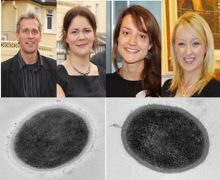2012 Press Releases
23.01.2012
New insights into how probiotic bacteria provide positive health benefits are published today in the prestigious international journal Proceedings of the National Academy of Sciences USA. The research, carried out by Saranna Fanning and Lindsay Hall and led by Professor Douwe van Sinderen and his colleagues at the Alimentary Pharmabiotic Centre in UCC along with collaborators at The Wellcome Trust Sanger Institute in Cambridge, UK, showed that the outer coating surrounding the probiotic Bifidobacterium breve UCC2003 plays a key role in its survival in the gut, its evasion of the immune system and is also involved in reducing infection levels of a gut pathogen.
Probiotics are bacteria which have been shown to have health benefits such as inhibition of cancer, reduction of infections and reduction of relapse in ulcerative colitis. However, the exact mechanisms underlying these health-promoting claims have remained unknown.
“In this study we have shown that the outer EPS (exocellular polysaccharide) coating of Bifidobacterium breve UCC2003 protects the bacteria from acid and bile in the gut and shields the bacteria from the host immune response. Mutants in which the EPS genes have been deleted were found to evoke stronger immune responses. The EPS coating was also shown to prevent colonisation by a gut pathogen Citrobacter rodentium in mice. This surface EPS-dependent pathogen defence represents an exciting new avenue for probiotic research” said Douwe van Sinderen, senior author on the publication. “This research has led to an improved understanding of how probiotic bifidobacteria contribute to human and animal health, thereby will help to support their inclusion in functional foods.”
The research, funded by Science Foundation Ireland, the Wellcome Trust and an EMBARK Postgraduate Scholarship and Travelling Studentship in the Sciences from IRCSET , is a culmination of several years’ work by the researchers led by Professor Douwe van Sinderen at the Alimentary Pharmabiotic Centre and Professor Gordon Dougan at The Wellcome Trust Sanger Institute in Cambridge.
The research is published online ahead of print in Proceedings of the National Academy of Sciences USA d.o.i.10.1073/pnas.1115621109 “Bifidobacterial surface-exopolysaccharide facilitates commensal-host interactions through immune modulation and pathogen protection.” Authors: Saranna Fanning, Lindsay J.Hall, Michelle Cronin, Aldert Zomer, John MacSharry, David Goulding, Mary O’Connell-Motherway, Fergus Shanahan, Kenneth Nally, Gordon Dougan and Douwe van Sinderen.
Picture: Scientists from the Alimentary Pharmabiotic Centre, UCC: Professor Douwe van Sinderen, Dr Saranna Fanning, Dr Lindsay Hall and Dr Michelle Cronin and transmission electron microscopy images of the probiotic Bifidobacterium breve UCC2003 EPS+ and EPS- mutant strains.

